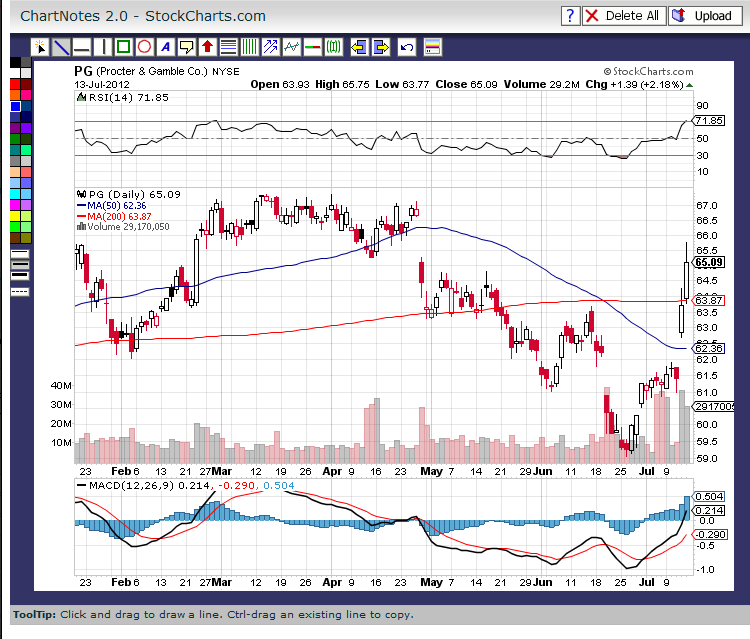Myth #1 - Efficient Market Hypothesis
Part 1 - Mastering the Psychology of the Stock Market Series
There's this long standing idea - popular among academics and passive investors - that at any given time, the stock market, along with individual stocks, are accurately priced.
Or to provide a more official definition, to quote Investopedia:
"The efficient market hypothesis (EMH) is an investment theory that states it is impossible to 'beat the market' because stock market efficiency causes existing share prices to always incorporate and reflect all relevant information."
So is that a convenient belief designed to give oneself a reassuring sense of order, or does it actually stand up in the real world?
Let's take a few swings at it and see for ourselves . . .
The Charts Sure Don't Look Efficient
The best case against EMH is simply looking at a 1-year chart - on just about any chart!
Seriously!
I've put together a ton of charts over the years, and even the tame ones quickly refute the idea that markets are efficient, rational, and logical. For instance, let's look at this 2012 chart on staid and boring consumer staples behemoth PG (Procter & Gamble).

PG is a pretty stable and boring company, an ideal poster child, you might think, for EMH.
So let's unpack the EMH thought process and see how well it holds up here.
- From late February to late April (2012), the stock basically traded in the mid to slightly upper $60s. There's some fluctuation in there, but only about a $2/share range.
- But something happened in late April (probably an earnings release that wasn't well received) and the stock started falling.
- In fact, it continued trading lower and lower and finally bottomed in late June around $59/share.
From top to bottom, that's roughly a 12% decline over two months.
Fair enough - an efficient market steadily and relentlessly reprices a stock over a two month period based on new information it gleaned from a quarterly earnings report.
But what happens next?
Immediately after bottoming around $59/share, from late June to mid-July, the stock rocketed higher and traded back into the mid-$60s.
Let's see if this makes sense . . .
- During the spring of 2012, a supposedly wise and rational Mr. Market prices PG at around $66-$67/share.
- But then he gets additional or updated information on the company and re-prices the value of the business 12% lower over two months.
- And then just three weeks later he quickly reprices the business yet again and returns it to the original value he'd appraised it at during the spring.
This is efficient?
Keep in mind this is a tame example.
Have some fun yourself and look at a one year chart on other (non-consumer staple) stocks and during any time frame - the more charts you look at, the harder it is to view the stock market as a rational and efficient pricing mechanism.
Warren Buffett Didn't Become Warren Buffett by Dollar Cost Averaging

It's easy to oversimplify Warren Buffett's success, but I'll try not to do that here.
Buffett stacked the deck brilliantly in his favor a couple of ways from the very beginning.
First, the structure of his early investment partnerships was much like that of a hedge fund where he received a cut from the returns he delivered - and he delivered some very good returns.
Second, after he dissolved the partnerships and acquired the textile operator Berkshire-Hathaway to use as his investment vehicle, he invested in high cash flow businesses (largely insurance in the early going).
And then he reinvested the cash flow into other high cash flow investments and continued the compounding process.
But not everyone realizes how Buffett evolved as a value investor over time.
Again, at the risk of oversimplifying, in the early going, Buffett's approach to value investing was primarily a function of price - acquiring assets at prices materially lower than their intrinsic value.
Later, partly from the influence of Charlie Munger, and partly out of necessity (as his crowing capital base required larger and larger acquisition targets), he began to focus more on quality vs. simply a cheap valuation.
Hence his famous quote:
"It's far better to buy a wonderful business at a fair price than it is to buy a fair business at a wonderful price."
But for the sake of this conversation, if EMH were really the norm, there would never be a "wonderful" price on anything.
If you follow the stock market - even a little - for any length of time, you realize that Mr. Market occasionally gives traders and investors who are paying attention huge gifts.
Like MCD around 2001-2002 and SBUX around 2008-2009.
The Limited Downside Letter is unlike your typical trade alert service - each week I go into in depth detail on my entire thought process related to trade selection and set up.
Yes, the entire market was crashing during those periods, but both of these iconic, powerhouse companies were also suffering from their own company specific problems.
So it was a double whammy effect and the shares were ridiculously cheap.
But get this - an Efficient Market never would've priced these businesses so cheaply.
That's because an Efficient Market would've recognized that each company had had enormous brand power and financial muscle to make whatever adjustments were necessary to right their respective ship.
And that's exactly what both companies did - and they're now trading thousands of percent higher.
Efficient Market Hypothesis?
More like Periodically Clueless Market Hypothesis.
Extreme Swings and Moves Shouldn't Exist in the Stock Market Under Efficient Market Hypothesis
For that matter, if the stock market was truly efficient, we would never see wild volatility or extreme sell offs and melt ups.
We wouldn't see flash crashes.
We wouldn't have seen crazy 1000 point price swings in the Dow back in October 2008 (at a much lower base, back when 1000 point swings were unprecedented and represented much larger percentage moves).
We wouldn't have seen all the crazy volatility we witnessed at the beginning of 2018.
Speaking of which, where do all those crazy back and forth swings come from in the first place?
Frequently, it's because some "smart money" somewhere overleveraged on a trade that went south on them and now there's margin calls and forced liquidations potentially into the billions.
Hardly efficient.
(Stay tuned - we'll definitely take some time to explore the myth of "smart money" in this series.)
Human Psychology is at the Heart of Everything Except the Stock Market?!?
Psychology - messy, irrational, psychology - permeates EVERYTHING that involves human beings.
But we're expected to believe that a world comprised almost entirely of money and ego is going to be a rational and reasonable place?
Look around your world.
From the car lot to the grocery store to the movie theater, more attention has been given to your psychology than to anything else.
That there are people who believe that rationality trumps psychology when it comes to the stock market reveals more about them than it does about the stock market.
What's Next?
Next up in our Mastering the Psychology of the Stock Market series, we're going to look at Stock Market Myth #2 - The Myth of Smart Money.
This is a fun topic.
That's because Smart Money is often extremely dumb in terms of investing skills and performance.
But there is one way (the only way, in fact) in which it's absolutely brilliant. But it's in a way that few people realize.
Tweet
Follow @LeveragedInvest
HOME : Stock Option Analysis and Articles : Myth of Efficient Market Hypothesis (Mastering the Psychology of the Stock Market Series - Part 1)

>> The Complete Guide to Selling Puts (Best Put Selling Resource on the Web)
>> Constructing Multiple Lines of Defense Into Your Put Selling Trades (How to Safely Sell Options for High Yield Income in Any Market Environment)
Option Trading and Duration Series
Part 1 >> Best Durations When Buying or Selling Options (Updated Article)
Part 2 >> The Sweet Spot Expiration Date When Selling Options
Part 3 >> Pros and Cons of Selling Weekly Options
>> Comprehensive Guide to Selling Puts on Margin
Selling Puts and Earnings Series
>> Why Bear Markets Don't Matter When You Own a Great Business (Updated Article)
Part 1 >> Selling Puts Into Earnings
Part 2 >> How to Use Earnings to Manage and Repair a Short Put Trade
Part 3 >> Selling Puts and the Earnings Calendar (Weird but Important Tip)
Mastering the Psychology of the Stock Market Series
Part 1 >> Myth of Efficient Market Hypothesis
Part 2 >> Myth of Smart Money
Part 3 >> Psychology of Secular Bull and Bear Markets
Part 4 >> How to Know When a Stock Bubble is About to Pop


